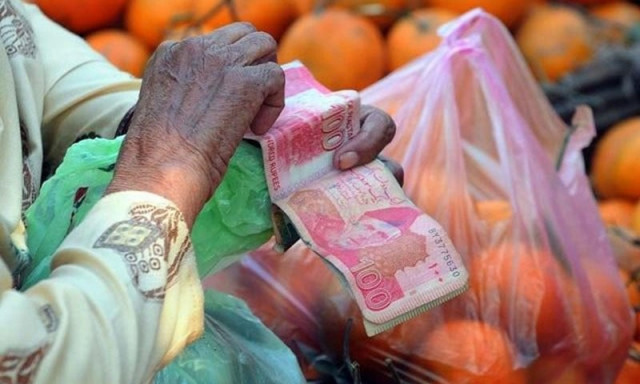Food inflation reaches 31.75% YoY
Inflation measured by SPI reached 31.75% on a year-on-year basis in the week ending on January 12

The trend of the rising prices carried on in the week that ended on January 12 with the inflation rate hitting 0.44% in comparison with the previous seven days and 31.75% on a year-on-year basis.
According to the figures released by the Pakistan Bureau of Statistics (PBS) on Friday, the prices of 23 essential items increased on a weekly basis including flour by 6.75%, liquefied petroleum gas (LPG) by 5.24%, plain bread by 4.85%, garlic by 4.51%, eggs by 4.17%, moong lentil by 4.11%, basmati (split) rice by 3.33%, split chickpeas by 2.39%, maash lentil by 1.69%, and mustard oil by 1.56%.
The rates of open as well as powdered milk, tea, firewood, onions, mutton, beef, and yoghurt also went up during the week under review.
However, the prices of seven items decreased during the week.
They include tomatoes which went down by 12.30%, potatoes by 7.75%, chicken meat by 4.46%, vegetable ghee by 0.29%, and sugar by 0.08%.
The prices of 23 essential items remained unchanged.
The inflation measured by the Sensitive Price Index (SPI) reached 31.75% on a year-on-year basis in the week ending on January 12.
According to the statistics of the week under review, the inflation rate for the group with income of up to Rs17,732 per month on an annual basis was 30.85%.
Similarly, the group with income from Rs17,733 to Rs22,888 per month, the inflation rate stood at 31.33%.
For the group having income from Rs22,889 to Rs29,517 per month, the inflation came to 33.14%.
For those having an income from Rs29,518 to Rs44,175 per month, the inflation rate was 34.13%.
The rate of inflation has been 31.67% for the group having a monthly income of more than Rs44,176.
The inflation rate had bounced back to 24.5% in December last year because of a major spike in the prices of food products.
The prices of a majority of consumer goods remained out of the reach of people, and the major surge was in the country’s rural areas where income levels were already low.
The surge might force the consumers to change their expenditure patterns to spare more money to buy essential foods.
The inflation rate beat the expectations of the finance ministry, which had forecast it to remain between 21% and 23%.
Food inflation had skyrocketed to nearly 38% in rural areas and it also significantly jumped to 32.7% in cities last month, the PBS data showed.



















COMMENTS
Comments are moderated and generally will be posted if they are on-topic and not abusive.
For more information, please see our Comments FAQ